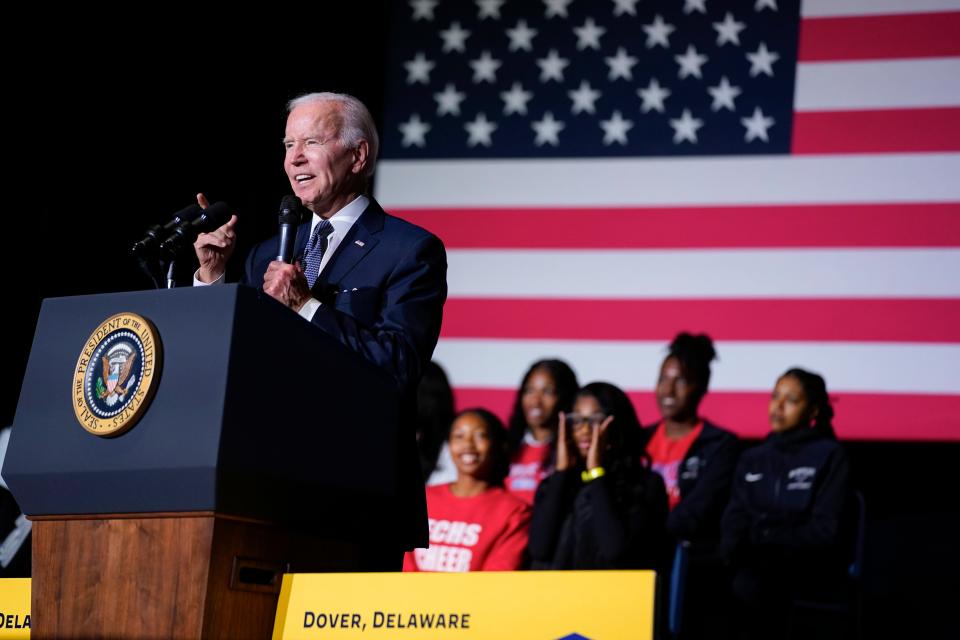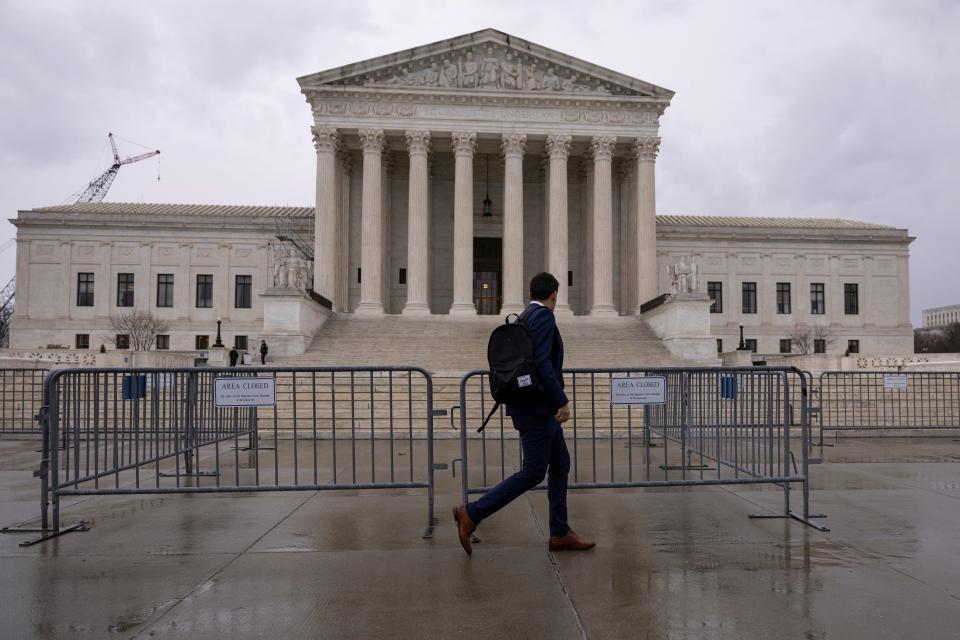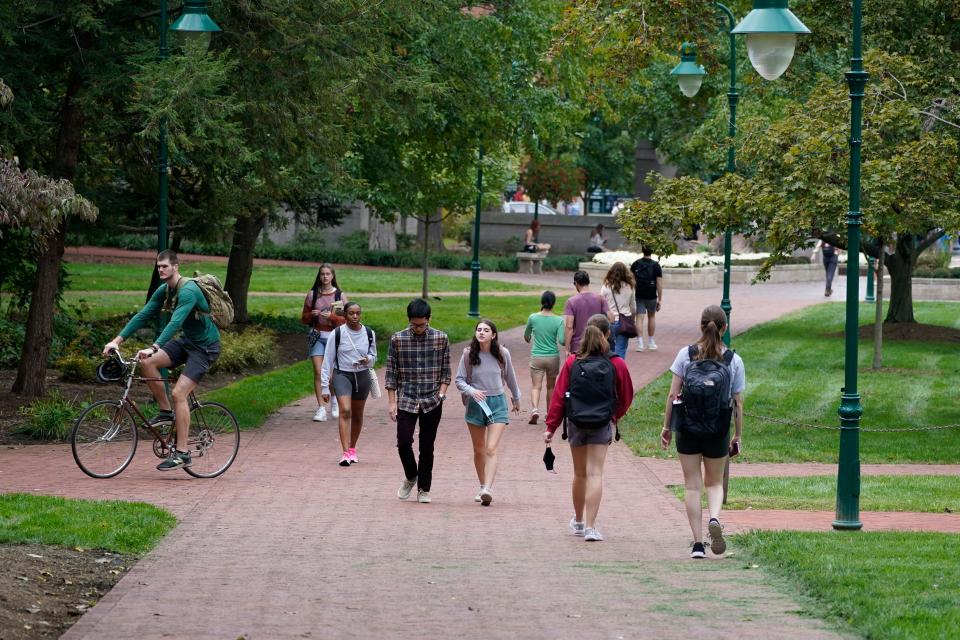Is Biden's student debt forgiveness plan dead? Four questions the Supreme Court could answer
- Oops!Something went wrong.Please try again later.
WASHINGTON – The Supreme Court battle over President Joe Biden's student loan forgiveness plan is about more than debt relief for 40 million Americans.
A much more sweeping debate about presidential power will linger just below the surface Tuesday as the high court begins to pick through Biden's $400 billion student debt plan over the course of several hours of oral arguments.
The court's decision, expected later this year, could torpedo Biden's ability to pursue other policies unilaterally – such as on abortion and immigration. And that could prove tricky for a president who is presumably seeking reelection with a gridlocked Congress.
"It is much bigger than student loans," said Christopher Walker, a professor at the University of Michigan Law School. "It's about the power of the courts and the power of the president."
Major question: Biden's ability to bypass Congress faces 'major' legal hurdle
Get ready: Student loan payments are set to restart in 2023. Here's how to prepare.
What the justices signal about that balance of power is one of several longstanding questions the nation's highest court could answer – or at least hint at – as Biden's debt plan gets its day in court. Here are some others:
Is Biden's student loan plan dead?
Biden's debt relief plan, the result of a campaign pledge, would forgive up to $20,000 in student loan debt for Pell Grant recipients and up to $10,000 for many other borrowers.
The effort has been on hold since a federal court blocked its implementation in October.
More to come: Millions of borrowers have had billions in student loan debt erased. Here's how
By the end of the Supreme Court’s oral arguments Tuesday, it may be possible to glean whether an estimated 40 million Americans will ever benefit from the plan. Advocates who support the effort are walking into the courtroom frustrated – but also hopeful.

"Borrowers want to know the fate of their student loans," said Natalia Abrams, president of the Student Debt Crisis Center, which advocates for borrowers. "But the law is on our side, and that is what keeps us going."
But the Job Creators Network Foundation, one of the groups challenging Biden's plan, views it instead as an illegal power grab.
States: Which states benefit the most from Biden's student loan forgiveness plan?
Calendar: Fate of Biden's student loan plan tops packed Supreme Court calendar
Blueprint: Best student loan refinance lenders of 2023
"If this is allowed to go through, it will give this president – and every future president – a blank check without any input from Congress or the American people," said Elaine Parker, the group's president.
Did Biden overstep his authority with debt relief plan?
Federal courts have clamped down on attempts by federal agencies to make significant policy decisions without explicit approval from Congress.
In one high-profile example in June, the Supreme Court invoked the "major questions doctrine" to strike down tighter rules on power plant emissions.
Under that doctrine, courts can invalidate regulations that have a major effect on the economy, are a matter of great "political significance" and are not explicitly authorized in the law – though no one is entirely sure how to define those terms.
Climate: How the Supreme Court's climate case could change Biden's presidency
Emergency: Could student loan debt plan be affected by end of COVID emergency?
Biden's lawyers insist the doctrine doesn't apply to the student loan dispute. Federal law, they told the Supreme Court, gives the government power to "waive or modify" loan rules to help Americans suffering from an emergency such as the COVID-19 pandemic.
"We just feel very confident," White House press secretary Karine Jean-Pierre said Thursday. "We see this as an important policy that is going to help tens of millions of Americans."
But many experts outside the administration are a lot less certain. The law doesn’t explicitly discuss a power to "forgive" loans. No prior administration has read it that way.
If the court gets into the major-questions doctrine, Walker predicted, Biden will lose.
"It's teed up pretty well," he said. "It's really hard to escape the conclusion that the Biden administration is using an old statute that was passed to deal with something different in a really broad, expansive way."

Is there any hope for student debt relief?
Biden's case isn't hopeless: Some experts believe the administration has a decent shot of convincing the Supreme Court that the wrong plaintiffs sued, for the wrong reasons.
If a majority of the court agrees, Biden could eke out a narrow win.
A threshold question the justices must decide is whether the states and the individual borrowers who sued over the plan were harmed by it – in other words, if they have standing to sue. If not, the court may never reach the central legal question of Biden's authority.
Even some conservatives acknowledge that the plaintiffs are in an unusual position. Two borrowers say they didn’t get enough debt relief. Six conservative states argue, in part, that a state-created entity that services student loans will lose revenue under the plan.
Case tracker: A look at the key cases pending before the Supreme Court
Cost of college: What happened to Biden's free college plan?
"There's a very strong case that neither set of parties has standing," said Mark Rahdert, a law professor at Temple University.
The government counters that the Missouri loan servicing entity is separate from the state and so can't be used by the state to establish standing. And the individual borrowers who say they don't get enough relief now would get nothing if the court ruled in their favor.
If the Supreme Court sides with the states on standing, Rahdert said, it could open the floodgates to all kinds of lawsuits from conservative and liberal states.
"It would basically enable whatever state is unhappy … to tie a national policy up in the courts," Rahdert said. "The long-term implications of that are pretty serious."

Is COVID-19 still a national emergency?
Former President Donald Trump declared a national emergency in response to COVID-19 in 2020 – unlocking additional powers for him and, later, his successor.
It was that emergency that let the Department of Education execute its loan forgiveness program. But Biden announced in January that he intends to end the emergency May 11.
The Supreme Court recently removed from its calendar another case based on a separate public health emergency that the White House will also let expire in May. That case dealt with the Title 42 program that permits the rapid removal of migrants.
So can student loan forgiveness continue even if the emergency is over?
Biden says it can. The law, his lawyers say, covers Americans who suffered economic hardship "as a direct result" of the emergency, regardless of whether the emergency is still in place.
The plaintiffs balk at that reading. The link between the program and the pandemic is "tenuous," they argue, and a "pretext for the president to fulfill his campaign promise."
This article originally appeared on USA TODAY: Joe Biden seeks to rescue student debt forgiveness at Supreme Court

